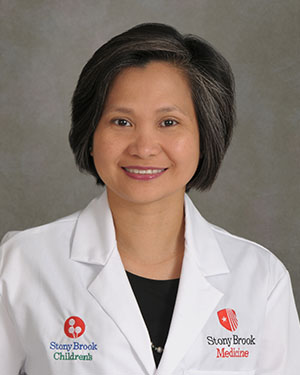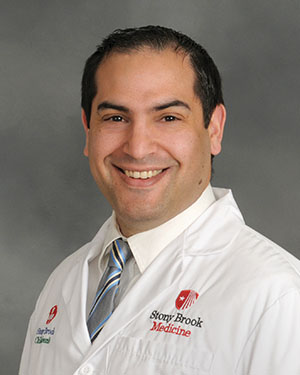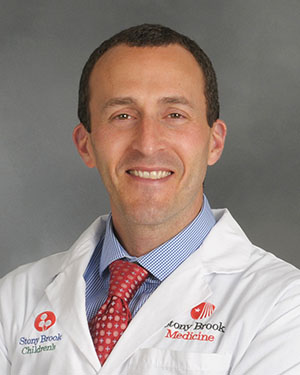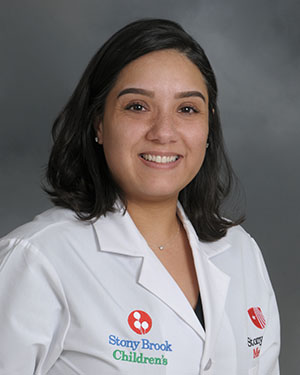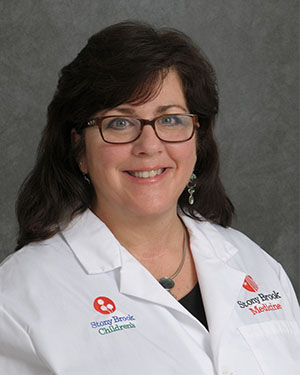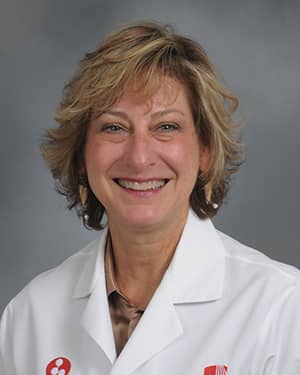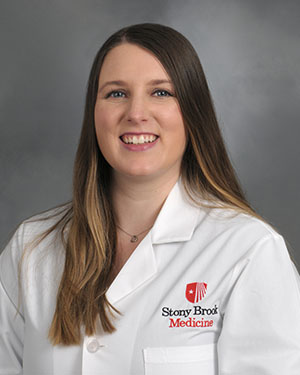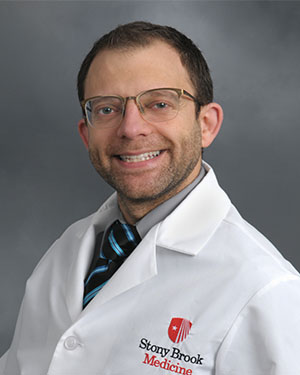Navigation Cystic Fibrosis Center
Cystic Fibrosis Center
Accredited by the Cystic Fibrosis Foundation since 1990, the Cystic Fibrosis Center at Stony Brook Children's Hospital oversees the care of many patients, from birth through adulthood. It is one of only 130 Centers accredited by the Cystic Fibrosis Foundation.
Our cystic fibrosis team includes physicians, a pediatric pulmonary nurse practitioner, nurses, respiratory therapist, pulmonology function technician, sleep technician, social worker, mental health coordinator, dietician, physical therapist, pharmacist and a genetic counselor, all who care for patients and their families. The CF patient and family advisory board members are also active participants of our team meetings.
Our Team
The Pediatric Pulmonary team is led by Catherine Kier, MD, a highly respected physician, researcher and educator. She and the other pediatric pulmonologists work with two pediatric nurse practitioners and a group of dedicated medical professionals to provide comprehensive, individualized care for patients, starting with the initial assessment and diagnosis through setting a plan of treatment and performing interventions and follow-up care.
In the case of cystic fibrosis (CF), where more and more patients are living well into adulthood, this follow-up care can last the course of their lifespan. The team also works closely with other departments throughout the hospital including pediatric hematology/oncology, pediatric gastroenterology, pediatric endocrinology, the neonatal intensive care unit and the pediatric intensive care unit.
In addition to serving patients, all members of the clinical team are engaged in pediatric pulmonary research and education.
FAQs
Cystic fibrosis is a genetic disease. An individual must inherit two defective copies of the cystic fibrosis gene — one from the mother and one from the father — to have cystic fibrosis. Individuals who only have one defective cystic fibrosis gene are called cystic fibrosis "carriers" and have no symptoms.
A person with cystic fibrosis has a problem with the transport of salt and fluid within the cells lining most body organs, such as the lungs and pancreas. The body produces abnormally thick, sticky mucus. In the lungs, thick mucus clogs the air tubes, causing respiratory symptoms (cough and trouble breathing) and repeated infections. In the pancreas, the tubes are blocked, preventing the enzymes from reaching the intestines. Without enzymes, food (especially fat) is not properly digested.
Cystic fibrosis presents with a variety of symptoms. The most common are repeated respiratory infections, persistent cough and wheezing, and poor weight gain with greasy, foul smelling stools. A cystic fibrosis person also has salty tasting skin because of a high level of salt in the sweat. This is the basis for the sweat test to diagnose cystic fibrosis. CF diagnosis can be as early as newborn to infancy because of the CF newborn screening, even when babies have no symptoms.
Each time two carriers conceive a child, there is a 25 percent chance that the child will have cystic fibrosis; a 50 percent chance that the child will be a carrier, and a 25 percent chance that the child will be a non-carrier.
There are about 30,000 people who have cystic fibrosis in the United States. Another 6 million are CF carriers. Cystic Fibrosis affects 1 out of every 3,000 Caucasians. The risk is lower in other races: 1 out of 13,000 African Americans and 1 out of every 32,000 Asian Americans.
A physician usually suspects cystic fibrosis based on symptoms or a family history of CF. The standard diagnostic test for cystic fibrosis is the sweat test. This is a simple and painless test.
Genetic testing is available for CF. This is a blood test that looks for defective cystic fibrosis genes (called cystic fibrosis mutations). It is a positive test when two cystic fibrosis mutations are found. A negative test does not totally rule out CF.
Mandatory newborn screenings for cystic fibrosis started in New York State in 2002. A baby may be diagnosed with cystic fibrosis even prior to symptoms, which is beneficial because an earlier diagnosis can lead to improved survival and quality of life.
A cystic fibrosis patient is referred to a Cystic Fibrosis Center after diagnosis. There are 130 accredited Cystic Fibrosis Centers in the United States.
A person with cystic fibrosis is treated at a center every three months, or more often as needed. The primary care physician is also involved in the care of the CF patient.
Blood tests, chest x-rays, pulmonary function testing and sputum cultures are obtained on a regular basis.
The treatment of cystic fibrosis depends upon the stage of the disease and which organs are affected. Getting the thick mucus out of the lungs (airway clearance) is very important. There are different techniques to do so, including chest physical therapy and using the Vest Airway Clearance System (VEST) to draw mucus from the lungs. Nebulizer treatments are given to help open the airways and control the lung infection. In addition, regular nutritional evaluation is important to provide a regimen for an adequate cystic fibrosis diet, enzyme and vitamin supplementation, as well as weight and growth monitoring.
Antibiotics are used to treat lung infections and may be given by mouth, through inhalation treatment or given intravenously depending on the particular need.
Recent medications called CFTR Modulators have been approved by the FDA, which have created great excitement in the cystic fibrosis community. They are a class of drugs that target the production and function of the CF protein and patients eligible to take this drug have noted significant improvement in symptoms and quality of life. The goal of the Cystic Fibrosis Foundation is for research to continue bringing newer therapies to all CF patients.
Currently, there is no way to prevent or cure cystic fibrosis. Genetic counseling is available to determine the family's chances of passing cystic fibrosis to their children. Prospective parents can opt for genetic testing as well as prenatal testing.
Research is ongoing in the hope to find a cure for cystic fibrosis in the future.
Patient Resources
CF Care Guidelines
The CF Foundation is a leader in efforts to advance and promote care that improves lives of people with cystic fibrosis. Care guidelines are created to bring together committees of experts including doctors, nurses, respiratory therapists, dietitians and CF families. CF Care Guidelines are available and discuss diagnosis, nutrition, gastrointestinal issues, respiratory care, infection control, age-specific care and antioxidants, along with supporting material.
CF Clinical Care Guidelines: https://www.cff.org
Informational Websites
- The CF Foundation: www.cff.org
- CF reference: www.ygyh.org/cf/whatisit.htm
- Starbright Foundation: www.starbright.org
- Pulmozyme Inhalation Solution and CF information : www.pulmozyme.com
- Tobramycin Inhalation Solution and CF information: https://cysticfibrosisnewstoday.com/tobramycin
Adult Cystic Fibrosis Program
The Stony Brook Adult Cystic Fibrosis Program has been following the adult CF patient population in Suffolk County since we opened in 2016. The Center includes a multidisciplinary team of physicians, cystic fibrosis nurse practitioner, social workers, mental health coordinator, nutritionist, respiratory therapist, sub-specialty providers, and genetic counselors who work with patients and families.
Our team provides inpatient and outpatient care at Stony Brook University Hospital. The Adult CF program works closely with the Pediatric Cystic Fibrosis program to assure coordinated transition from pediatric to adult CF care, as well as collaborative research and performance improvement projects to improve the care for our patients.
Transition from Pediatric to Adult Cystic Fibrosis Care
The Adult Cystic Fibrosis Program works closely with Dr. Kier and the pediatric CF team to assure a well-coordinated transition from pediatric to adult care. We have structured our cystic fibrosis program to assure that coordination using a shared nurse coordinator allows patients to seamlessly make the transition. In addition, our adult cystic fibrosis physicians will also conduct meet and greet visits in conjunction with the pediatric CF team to meet the adult CF physician, learn about the adult approach to CF care, and to answer questions that patients and families may have regarding the adult CF program.
The Cystic Fibrosis Foundation also has additional resources on making the transition from pediatric to adult care available on their website.
Adult CF Team
The Stony Brook Adult Cystic Fibrosis Program includes a dedicated team of physicians, nurses, nurse practitioners, dieticians, social workers, and respiratory therapists to assure that a well designed and tailored treatment plan is set in collaboration with the needs of the patients.
Contact Us
Stony Brook Adult Cystic Fibrosis Program
269 East Main StreetEast Islip, NY 11730
Center Phone Number: (631) 444-8340
Appointments: (631) 444-5437

